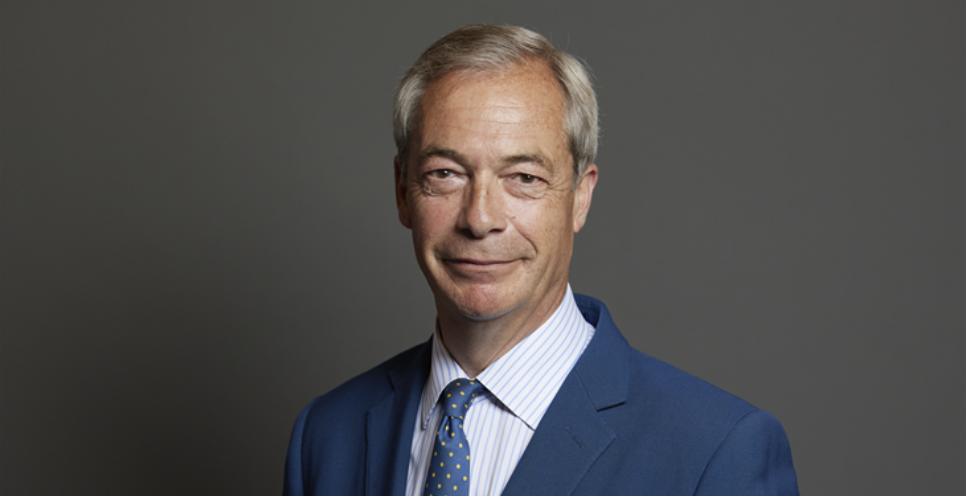As Reform UK’s support surges in UK-wide and Welsh polls, bringing the right-wing, anti-immigration party led by Nigel Farage closer to political prominence, serious scrutiny has turned to its stance on LGBTQ+ rights. Recent polling by YouGov and ITV Wales reveals Reform UK climbing to 29 percent in Welsh Parliament preferences, nearly matching Plaid Cymru, while Labour’s support declines sharply. At Westminster, Reform UK’s projected win of 271 seats, a substantial increase from the five it secured at the 2024 general election, signals a potential seismic shift in British politics. Yet, this ascendancy is shadowed by the party’s deeply troubling record on LGBTQ+ issues and the long-held views of its leader.
Throughout England, Reform UK’s control of ten councils has translated into controversial local policies, most notably the banning of Pride flags on public buildings. This hardline stance was introduced shortly after the May 2025 local elections, with Reform’s former chairman Zia Yusuf declaring that councils under their control would restrict flag flying to only the Union Jack, St George’s flag, and county flags. The policy sparked backlash, particularly in places like Durham, where the removal of the Pride flag ahead of an Armed Forces Pride event was publicly condemned as 'disrespectful' by councillors like Liberal Democrat Ellie Hopgood. Nevertheless, Reform representatives defend this as a stance against 'tokenism,' emphasizing their pride in national symbols over 'special interest groups.' Similar moves in Kent saw the Pride and Ukrainian flags removed from council chambers, with Reform’s local leadership asserting that such symbols do not federate shared identity in the way national and county flags do.
The party’s social policies extend beyond symbolic gestures. Reform UK’s manifesto, Our Contract With You, includes explicit commitments to roll back protections and recognitions for transgender people, particularly in education. The document frames what it terms 'transgender indoctrination' as harmful to children and promises to ban the use of gender pronouns, social transitioning, and gender-questioning in schools. It further pledges mandated single-sex toilets and changing rooms, not only within schools but across public buildings, signalling a broad legislative agenda aimed at curbing trans rights. Reform’s rhetoric also connects gender identity issues and Critical Race Theory to alleged free speech censorship, advocating a hands-off approach that selectively dismisses these matters as baseless ideologies.
A broader assault on equality laws complements these stances. Reform pledges to dismantle Diversity, Equality, and Inclusion (DE&I) policies, which they claim undermine economic productivity, and targets the 2010 Equality Act, alleging it fosters discrimination under the guise of 'positive action.' This approach reflects a wider conservative pushback against progressive social protections and apes what is going on in Trumps US right now.
Polling among Reform UK’s voter base reveals complex attitudes: while a significant 69% oppose allowing trans individuals to amend their legal gender via Gender Recognition Certificates, 65% surprisingly support same-sex marriage. This nuanced voter sentiment, however, diverges from Nigel Farage’s unequivocal opposition to marriage equality, despite being divorced from his first wife and separated from his second. Well, you can hardly blame them. Farage’s history on LGBTQ+ matters spans over a decade of contentious remarks. In 2014, he publicly opposed same-sex marriage pending the UK’s departure from the European Court of Human Rights jurisdiction—a point he reiterated in 2025, lamenting that the Civil Partnership system, rather than marriage equality, was adequate. His further comments suggested a preference for traditional heterosexual relationships.
Farage’s record extends to other troubling remarks, including a 2019 statement advocating that people living with HIV should be barred from UK entry—a controversial stance linking immigration concerns and public health with stigmatization. Moreover, his revisionist view of Margaret Thatcher’s legacy downplays the harm caused by Section 28, legislation that banned 'promotion' of homosexuality in schools under her government, suggesting it was a measure against 'extreme left-wing' influences rather than outright discrimination.
This trajectory places Reform UK firmly within an exclusionary, reactionary framework on LGBTQ+ rights, from symbolic erasure of Pride flags to legislation curbing trans youths’ rights and a leadership openly resistant to marriage equality. As electoral contests approach, these positions will weigh heavily not only on the LGBTQ+ community but on all voters concerned about the state of social protections and civil liberties in the UK.
Source: Noah Wire Services
